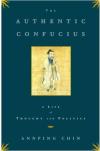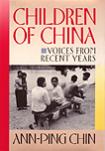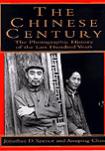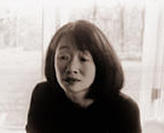Annping Chin
Asia: Chinese intellectual history; Confucianism; pre-modern Chinese history; Chinese cultural history 1500-1800; Studies in Chinese classical texts
Annping Chin was born in Taiwan in 1950, to a mainland Chinese family that had moved there in 1948. She came with her family to Richmond, Virginia in 1962. She studied mathematics at Michigan State University and received her Ph.D. in Chinese Thought from Columbia University. She has written three books: Children of China: Voices from Recent Years (Knopf, 1989), based on interviews with Chinese children living in the People’s Republic of China; Tai Chen on Mencius (Yale University Press, 1990), a study of eighteenth century Chinese intellectual history; and most recently, Four Sisters of Hofei (Scribner, 2002), a history of China’s last century through the lives of four highly educated and accomplished women. She has also co-authored, with Jonathan Spence, Chinese Century: A Photographic History of the Last Hundred Years (Random House, 1996). Her fields of study include Confucianism, Taoism, and the Chinese intellectual tradition. She was on the faculty at Wesleyan University and is currently teaching in the History Department at Yale University.
Education
B.S.—Michigan State University in Mathematics, 1972.
Ph.D.—Columbia University in Chinese Thought, 1984. (East Asian Languages & Cultures)
Courses Taught
Department of Religion, Wesleyan University
- Taoism
- Confucianism and Neo-Confucianism
- Religious Consciousness of the Six Dynasties
Department of History, Yale University
- Early Texts in the Chinese Intellectual Tradition (lecture course)
- The Confucian Tradition (undergraduate seminar)
- Basic Texts of Confucianism (graduate seminar)
- Intellectual Themes in the Warring States period (graduate seminar)
- Traditional Chinese Historiography (undergraduate and graduate seminar)
- Topics in Qing Intellectual History (graduate seminar)
- Readings in the Mencius, the Zhuangzi, and the Xunzi (graduate seminar)
- Histories and Fiction in Early China (graduate seminar)
- History and Aesthetics in the Ming-Qing Transition (graduate seminar)
- Chinese Cultural History, 1500-1800 (undergraduate seminar)
Publications
Books
- Children of China: Voices from Recent Years. (New York: Alfred Knopf, 1988; Cornell University Press, paperback edition, 1989)
- Tai Chen on Mencius: Explorations in Words and Meaning, co-authored with Mansfield Freeman. (New Haven: Yale University Press, 1990)
- The Chinese Century: A Photographic History of the Last Hundred Years, co-authored with Jonathan Spence. (New York: Random House, 1996)
- Four Sisters of Hofei. (New York: Scribner, 2002)
- The Authentic Confucious: A Life of Thought & Politics. (Scribner, 2007)
- The Life of the Analects. (Forthcoming with Princeton University Press)
Recent Essays
- “Chengzhi wenzhi in light of the Shangshu.” Conference volume of the International Conference on the Guodian Bamboo Manuscripts from the Ancient State of Chu. (Wuhan: Hubei People’s Press, 2000.)
- “Zhan Roshui” in Encyclopedia of Chinese Philosophy. (New York: Routledge, 2003.)
- “Confucius and the Book of Poetry.” (forthcoming in the conference volume of Poetic Thought and Hermeneutics in Traditional China: A Cultural Perspective.)
- “Teaching Three Disciples: Confucius in His Later Years” (forthcoming in the conference volume of Confucianism Resurrected: International Conference on Excavated Chinese Manuscripts)
-
“Understanding yangong(??) in Two Ways: Lessons from the Xunzi and the Guodian Bamboo Slips” in Reconsidering the Pre-Qin Philosophical Tradition in the Context of Recently Excavated Texts. (Taipei: Taiwan Shufang, 2007.)(in English); in Rulin, no.3, 2006 (in Chinese)
- “Is a Shi Nobler Than a King: Conversations between Mencius and King Xuan of Qi” (forthcoming in Rulin (in English)); in Zhongguo ruxue, no.2, 2006 (in Chinese).
- “Understanding Xunzi and Zhuangzi through Hui Shi.” Conference volume of the International Conference on the Thought of Xunzi (in English).
Participation at Research Conferences
- International Conference on the Guodian Bamboo Manuscripts from the ancient state of Chu, Wuhan University, 1999.
- International Conference on Recently Discovered Chinese Manuscripts, Peking University, August, 2000.
- International Conference on Recently Discovered Bamboo and Silk Manuscripts and their Relation to Confucian Thought, Tsinghua University, April, 2002.
- International Conference on Poetic Thought and Hermeneutics in Traditional China: A Cultural Perspective, Yale University, May, 2003.
- International Conference on Excavated Chinese Manuscripts, Mount Holyoke College, April 23-25, 2004.
-
International Conference on Reconsidering the Pre-Qin Philosophical Tradition in the Context of Recently Excavated Texts, Taiwan National University, March 25-26, 2005.
- International Symposium on the Contemporary Values of Mencius Thought, Confucian Institute, Shandong University. (The conference took place in Zoucheng, Shandong, April 25-28, 2006)
- International Conference on the Thought of Xunzi, Shandong University. (The conference took place in Linyi, Shandong, August 6-9, 2007)
Current Research Interests
In the last two decades, studies of excavated texts (bamboo and silk) have become a driving force in the revival of traditional scholarship in China. These are often collective efforts – large and time-consuming projects – involving archaeologists, philologists, historians, and philosophers. They also draw together experts from China, Taiwan, Hong Kong, and the West. These scholars gather to talk and debate the textual problems and the consequences these texts have on our understanding of early China. I have been reading bamboo-slip manuscripts since 1998 when the first of such texts was published, and in the last ten years I feel I have become a member of that scholarly community. I was asked to participate in seven international conferences and to present papers in six and be a discussant in one. I have also organized a workshop on bamboo-slip texts at Yale in April of 2004. Around ten leading scholars from China, Taiwan and Hong Kong participated in this workshop.
My interest in the bamboo-slip manuscripts also intersects with my work on Confucius, for the most important and the most exciting of the excavated texts deal with moral and political philosophy, and one set, dated to 300 B.C., constitutes the earliest manuscripts we have of Confucius either discussing an even earlier text or having a conversation with his disciples about moral cultivation or government policies. These new discoveries are an integral part of my recent book on Confucius, which was published in November, 2007, with Scribner, and of another project on the history of the Analects, which is under contract with Princeton University Press.
<br>





